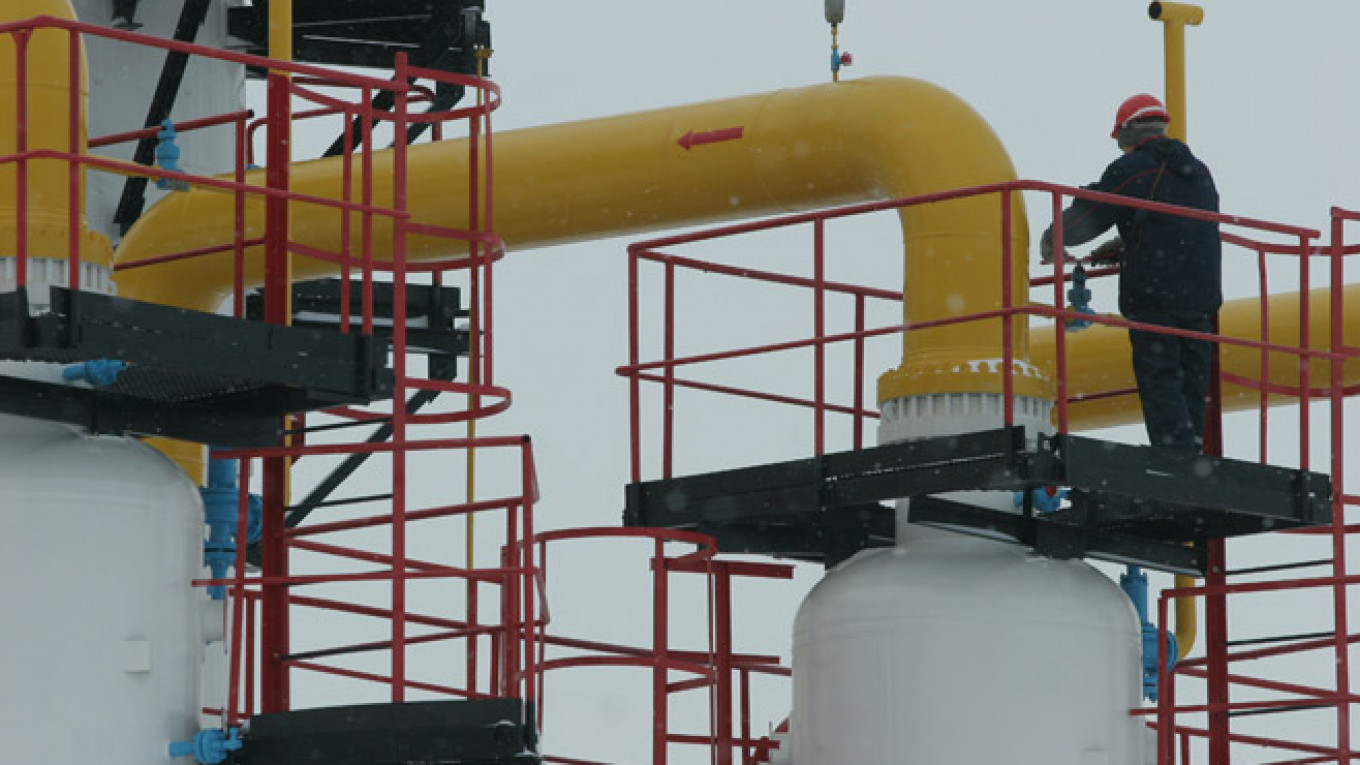MILAN/LONDON — Ukraine's stored gas reserves are sufficient to help meet domestic needs well into the winter months should Russia cut supplies as authorities step up efforts to rebuild inventories.
To prepare for any potential disruption, Ukraine's gas transit monopoly Ukrtransgas is packing 850 million cubic meters of gas per week into underground storage sites, largely located in its western territory.
Ukraine meets around half its gas demand through imports from Russia — the rest from domestic production — and it is an important transit route for Russian gas to the European Union.
Moscow cut supplies to Ukraine in the winters of 2006 and 2009 due to the unauthorized siphoning off of supplies intended for Europe, causing knock-on shortages across the continent.
Data from Gas Infrastructure Europe, or GIE, shows Ukraine now has close to 11 billion cubic meters, or bcm, of gas in storage and is building inventories at a rate of 8 percent per week, mostly using Russian supply.
Ukraine's annual gas consumption is around 55 bcm, which means currently stored gas would meet about a fifth of that.
Despite rapid buildup, Ukrainian stock levels of 34 percent full still lag the European average of 58.7 percent full, according to the latest GIE data published Tuesday.
A mild winter, ample supplies and low demand across Europe have boosted stockpiles and forced down gas prices to multi-year lows, in a sign that markets have discounted the risk of a Russian supply cutoff.
European gas traders said concerns about Ukraine have faded over the past couple of weeks and any potential supply cut would be short-lived.
"With headlines regarding the willingness of the new Ukrainian President-elect Poroshenko to talk with Russia, British gas prices started Monday morning with a drop to their lowest levels this year," analyst Trevor Sikorski at consultancy Energy Aspects said.
Healthy Supplies
Concerns about a gas supply cut to Ukraine were high after Russia's seizure of Crimea in March, causing benchmark European gas prices to rally briefly, but they were trading at more than two-year lows on Wednesday.
Ukraine has refused to pay the gas price Russia is asking, accusing Moscow of using energy supplies to punish the country for trying to break free from its influence.
Europe's Energy Commissioner Guenther Oettinger said Tuesday he was optimistic that all sides in the talks between Russia and Ukraine could overcome their differences in the next few days.
Of Ukraine's 33 bcm of storage capacity, GIE data shows about 80 percent is in the country's far western region, so even in the case of a Russian intervention in Ukraine's predominantly Russian east, most storage assets would likely remain safe from seizure.
Russia remains Europe's biggest supplier of gas and has supplied ample gas to both Ukraine and Europe in recent months.
Anaemic demand also looks set to keep European gas markets well supplied through this year and next, according to French bank Societe Generale.
Gas demand across seven countries which make up 63 percent of total EU gas consumption- including Britain, Italy and Spain — fell 21 percent in the first quarter versus the prior year period, lead Societe Generale analyst Thierry Bros said.
"Not only are we back to pre-2000 levels of demand, but we now see no chance of the 500 bcm level being attained [in Europe] even in the case of an extremely cold winter," he said, referring to annual European demand for gas.
However, some analysts also warned that the real risk is next winter when Ukraine's reserves are likely to be less full and demand much higher.
A Message from The Moscow Times:
Dear readers,
We are facing unprecedented challenges. Russia's Prosecutor General's Office has designated The Moscow Times as an "undesirable" organization, criminalizing our work and putting our staff at risk of prosecution. This follows our earlier unjust labeling as a "foreign agent."
These actions are direct attempts to silence independent journalism in Russia. The authorities claim our work "discredits the decisions of the Russian leadership." We see things differently: we strive to provide accurate, unbiased reporting on Russia.
We, the journalists of The Moscow Times, refuse to be silenced. But to continue our work, we need your help.
Your support, no matter how small, makes a world of difference. If you can, please support us monthly starting from just $2. It's quick to set up, and every contribution makes a significant impact.
By supporting The Moscow Times, you're defending open, independent journalism in the face of repression. Thank you for standing with us.
Remind me later.






